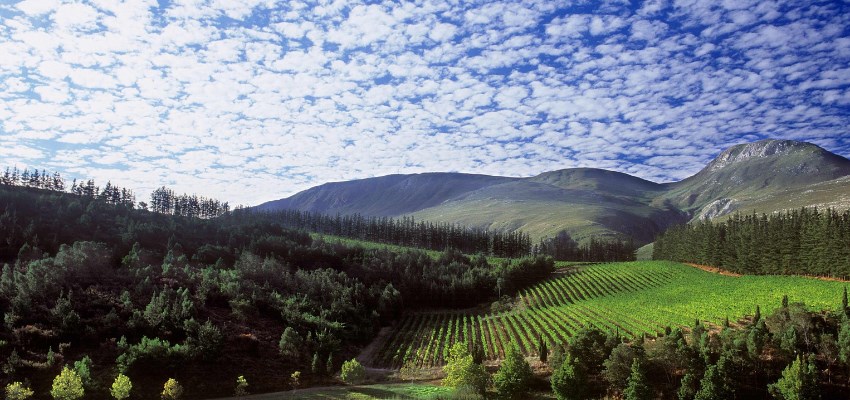
Paul Clüver Family Wines has released the icon top-tier wines from the two grape varieties it pioneered in the Elgin region, namely its flagship Seven Flags Chardonnay and Seven Flags Pinot Noir from the 2024 and 2023 vintages, respectively.
Seven Flags stands at the apex of the Clüver portfolio. Paul Clüver Jnr, managing director of Paul Clüver Family Wines, says the Seven Flags concept was conceived not as a reserve by default.
“The wines began as a selection based on vineyard performance and sensory integrity, intended to reflect the most complete expression of variety and place the estate can summon in any given year,” he says. “The newly released Seven Flags Chardonnay 2024 and Seven Flags Pinot Noir 2023 articulate this philosophy with impressive clarity. They underline the steady maturity of our Elgin vineyards and the deepening confidence of the winemaking team in coaxing nuance and longevity from the valley’s climate through Pinot Noir and Chardonnay, the two varieties at the heart of the Paul Clüver Family Wines ethos.”
The Elgin Valley’s climatic gift lies in the extended growing season. Cool winters, moderate summers and significant diurnal shifts preserve acidity while allowing flavour to build at a measured pace. These conditions demand patience, meticulous vineyard work and a keen eye on weather windows. When handled well, they produce wines with modest alcohol, bright tension and savoury depth, offering a compelling counterpoint to richer styles from warmer Cape regions.
“Both 2023 and 2024 showed the virtues and vulnerabilities of this cool-climate setting,” says Andries Burger, cellarmaster at Paul Clüver Family Wines. “The 2023 season for Pinot Noir was defined by dryness at the outset, followed by a series of well-timed rain showers that slowed ripening and protected fruit from heat stress. Moderate sugar accumulation and naturally high acidity created a platform for precision and aromatic lift.
“The 2024 Chardonnay vintage, meanwhile, posed early challenges. A cool, wet spring delayed growth and reduced yields. Yet the small berries and extended ripening window rewarded patience with fruit of notable flavour intensity and structural presence.”
Pinot Noir has been a priority at Paul Clüver since 1989. The vines are rooted in Bokkeveld shale with clay subsoils at elevations between 280 and 400 metres above sea level, planted on a range of aspects to harness morning light while moderating afternoon heat.
The winemaking remains Burgundian in inspiration. Every berry is individually sorted by hand. Gravity flow is used whenever possible and extraction is gentle, via hand punch-downs no more than twice daily. Fermentation begins spontaneously in wooden vats, with only a portion inoculated to ensure completion. Maturation takes place in French oak for 12 months, with 37.5% new barrels and the remainder second and third fill. Crucially, the final selection is not predetermined. The Seven Flags component is assembled only after blind assessment of every Pinot Noir barrel in the cellar, reinforcing vineyard excellence rather than hierarchical assumption.
In the glass, the 2023 Pinot Noir is bright and translucent, a cue to the lifted aromatics that follow. Red and black berry fruit anchors the nose, joined by floral notes and finely judged oak. The palate is detailed and poised, driven by lively acidity and a fine yet assertive tannin line that frames the fruit without overwhelming it. Savoury elements appear mid-palate, adding complexity. Alcohol is moderate at just under 14%, maintaining overall balance and length. The finish is long and confident, indicative of both site and intent.
Though approachable now, the structure and integrated acidity suggest several years of rewarding cellaring. Its elegance is not at the expense of substance, and its substance is delivered without heaviness. In a South African context, this is a Pinot Noir operating firmly at the top tier.
Chardonnay is arguably the estate’s deeper legacy.
“Paul Clüver planted its first vines in 1987, making them the oldest Chardonnay vineyards in Elgin,” says Burger. “Seven Flags is sourced specifically from these pioneering south-facing blocks. The vine age contributes a sense of rooted authority, while the Bokkeveld shale and clay soils lend minerality and textural drive.”
The winemaking philosophy is minimalist yet exacting. The fruit is whole-bunch pressed and the juice transferred to barrel without settling agents. Fermentation proceeds entirely with indigenous yeasts. Malolactic conversion is blocked to retain maximum natural acidity. A mix of French oak is used, with half the barrels new, though lees work is restrained, the aim being clarity and drive rather than overt richness.
“The resulting wine is immediately expressive of citrus and orchard fruit, underscored by a palpable mineral thread that keeps the profile taut,” says Burger. “The acidity is vivid but not aggressive, acting as the wine’s spine, giving shape and carrying the flavours to a persistent finish. Oak influence is evident in the wine’s creamy texture and structural weight, although it plays a supporting role rather than dictating style.”
Clüver Jnr says both new releases make a persuasive case for Seven Flags as one of the leading cool-climate expressions in the Cape. “The wines show refinement rather than force, capturing the essential Elgin qualities of brightness, clarity and length,” he says. “More importantly, they exemplify a producer that continues to interrogate its own methods, selecting for precision and nuance in a classic, Old World approach to its noble Burgundian varieties.”